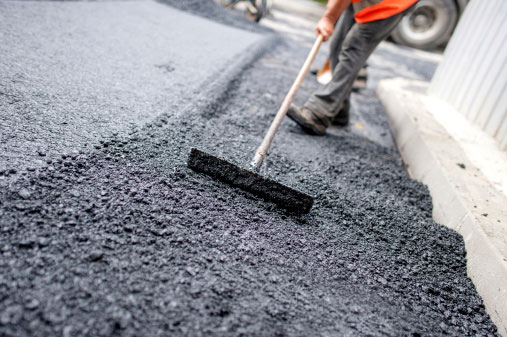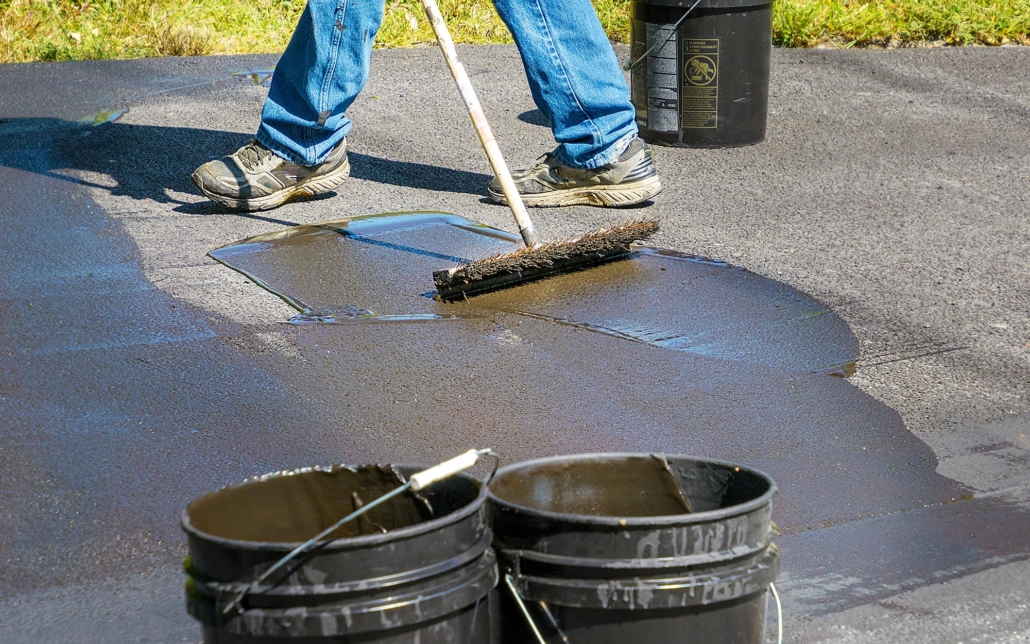Unlock the Secrets of Asphalt Sealing: Maximizing Warm Mix Asphalt Long Life
Unlock the Secrets of Asphalt Sealing: Maximizing Warm Mix Asphalt Long Life
Blog Article
Hot Mix Asphalt: A Sustainable Service for Pavement
Hot Mix Asphalt (HMA) has actually arised as a leading lasting selection for pavement options, using a myriad of cutting-edge technologies and ecological benefits. As the need for environmentally friendly building and construction techniques expands, exploring the subtleties of HMA's sustainability can give important insights right into the future of pavement services.
Environmental Advantages of Warm Mix Asphalt

In Addition, Warm Mix Asphalt helps to alleviate city warmth island impacts. Its dark shade soaks up sunshine, decreasing the amount of warm mirrored back into the ambience contrasted to lighter-colored sidewalks. This can decrease ambient temperatures in urban locations, decreasing the need for a/c and eventually lowering energy usage.
In addition, Hot Mix Asphalt adds to boosted stormwater management. Its porous nature allows water to infiltrate the sidewalk and recharge groundwater supplies, decreasing drainage and the danger of flooding. These ecological advantages make Hot Mix Asphalt a sustainable choice for paving roadways and highways.
Power Efficiency in HMA Production
Is energy performance an essential consider the production of Warm Mix Asphalt (HMA)? Definitely. Power plays a considerable duty in the manufacturing of HMA, impacting both expense and environmental sustainability. One crucial element of energy effectiveness in HMA manufacturing is making use of warm mix asphalt (WMA) innovations (commercial parking lot paving). WMA allows for the blending and placement of asphalt at reduced temperature levels compared to typical warm mix asphalt, resulting in reduced energy consumption during production. This procedure not only reduces fuel use but also lowers greenhouse gas discharges, making it a much more eco-friendly choice.
Additionally, improvements in plant technologies have resulted in even more energy-efficient HMA production processes. Modern plants are made with functions like recycled asphalt sidewalk (RAP) handling capacities, effective heater systems, and improved insulation, all adding to power savings. By maximizing power usage in HMA production, the market can minimize its carbon impact while keeping premium sidewalk products. Energy performance is, for that reason, an essential factor to consider in making sure the sustainability of Hot Mix Asphalt production.
Recyclability of Hot Mix Asphalt
The recyclability of Hot Mix Asphalt (HMA) is a critical aspect of its sustainability and wikipedia reference long-lasting environmental impact. HMA is among one of the most recycled products in the United States, with over 100 million lots of recovered asphalt sidewalk (RAP) being recycled annually in new sidewalk building. Reusing HMA provides numerous ecological benefits, such as lowering the need for virgin products, reducing energy consumption during manufacturing, and reducing the amount of waste sent out to landfills.
The process of reusing HMA entails crushing the existing sidewalk, crushing it into smaller sized pieces, and blending it with new accumulation and asphalt binder to produce a recycled mix. Overall, the recyclability of HMA plays a substantial function in promoting sustainable methods within the pavement sector.

Long-Term Performance of HMA
Asphalt sidewalks show resilience and resilience over an extended period, reflecting the long-term efficiency of Warm Mix Asphalt (HMA) In addition, innovations in HMA technology, such as the use of polymer-modified binders and cozy mix asphalt, have additionally improved the longevity and long life of HMA pavements. By focusing on top quality building and upkeep practices, HMA continues to confirm itself as a sustainable and cost-efficient remedy for resilient pavement facilities.

HMA: Sturdiness and Sustainability
Demonstrating both longevity and sustainability, Warm Mix Asphalt he said (HMA) has actually come to be a cornerstone in the building of resilient sidewalk infrastructures - commercial parking lot paving. HMA's resilience stems from its capacity to endure heavy tons, severe climate condition, and high traffic volumes, making it a trustworthy option for streets, highways, and airport paths. The make-up of HMA, which typically includes accumulations, binder, and filler, plays a vital function in enhancing its durability and resistance to tear site here and put on
In addition, HMA's sustainability exists in its recyclability and energy-efficient manufacturing procedure. The ability to reuse reclaimed asphalt pavement (RAP) in brand-new HMA mixes decreases the demand for virgin materials and reduces the ecological impact of sidewalk building and maintenance. Furthermore, the energy efficiency of producing HMA hinges on its lower blending temperature levels compared to various other pavement materials, resulting in reduced power consumption and greenhouse gas discharges.
Final Thought
In conclusion, hot mix asphalt (HMA) supplies a sustainable solution for sidewalk with its environmentally friendly attributes. HMA's recyclability, power performance in manufacturing, and long-term sturdiness make it an eco-friendly selection for road building. By preserving natural deposits, minimizing waste, and lowering greenhouse gas emissions, HMA plays a critical duty in advertising sustainability in framework advancement. Its capability to reduce urban warmth island effects better emphasizes its value in creating durable and eco aware sidewalk systems.
HMA is one of the most recycled materials in the United States, with over 100 million loads of redeemed asphalt pavement (RAP) being reused yearly in new pavement building and construction.The process of recycling HMA includes grating the existing sidewalk, crushing it into smaller pieces, and blending it with brand-new accumulation and asphalt binder to produce a recycled mix.Asphalt sidewalks show sturdiness and resilience over an extended period, mirroring the lasting performance of Hot Mix Asphalt (HMA) Additionally, innovations in HMA technology, such as the usage of polymer-modified binders and warm mix asphalt, have additionally enhanced the resilience and longevity of HMA sidewalks. The ability to recycle reclaimed asphalt pavement (RAP) in new HMA mixes minimizes the demand for virgin materials and reduces the environmental impact of sidewalk building and construction and maintenance.
Report this page